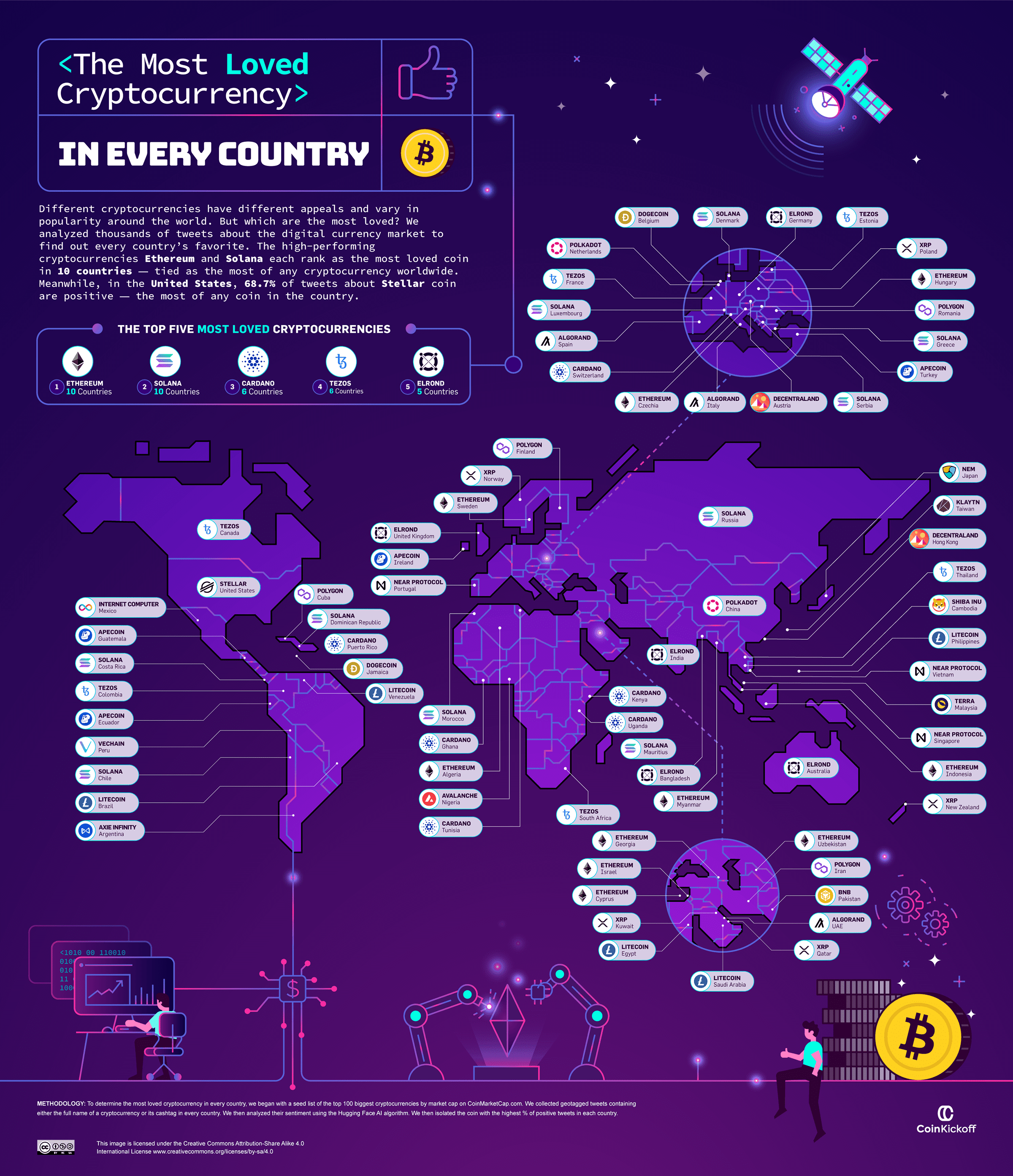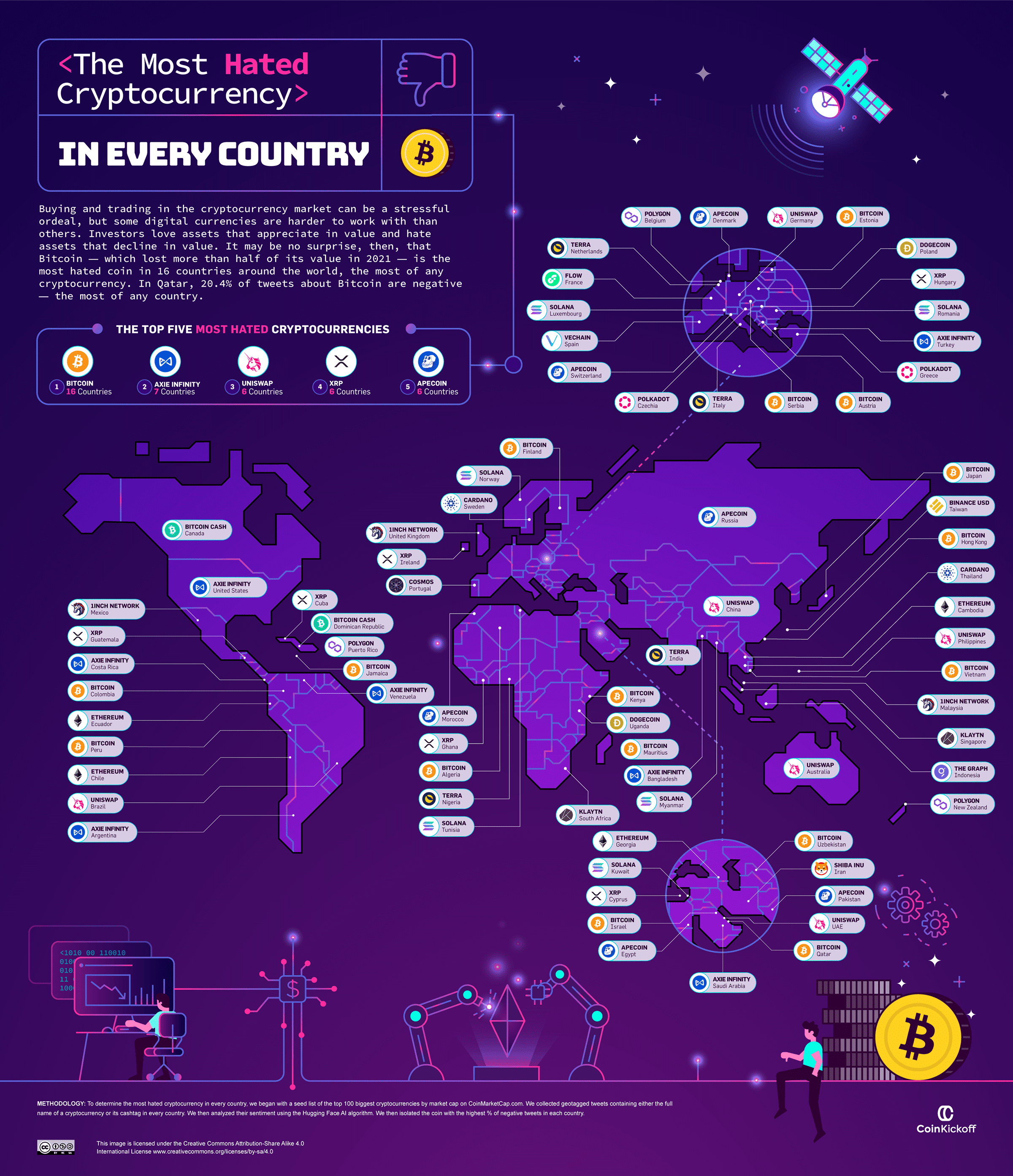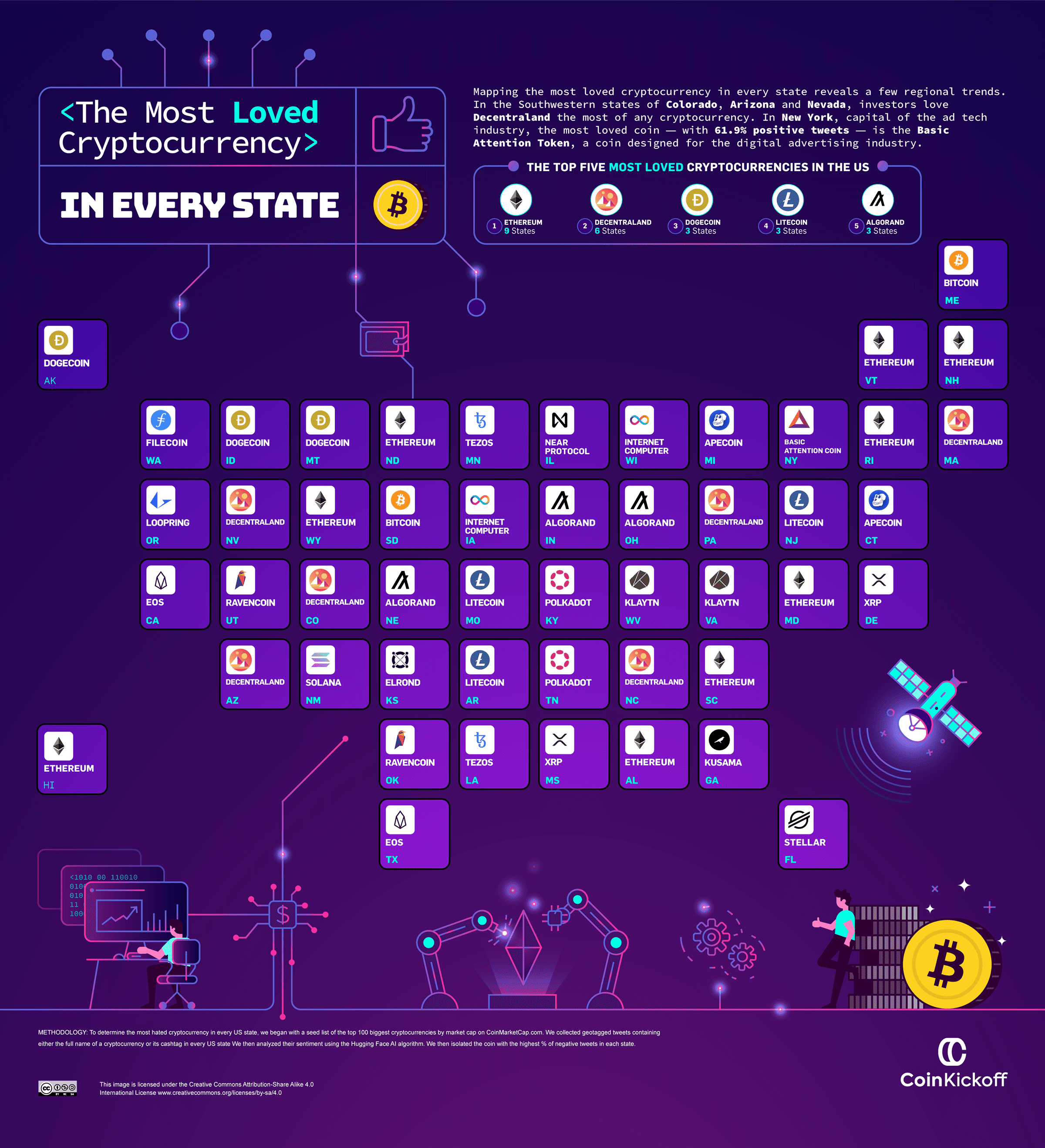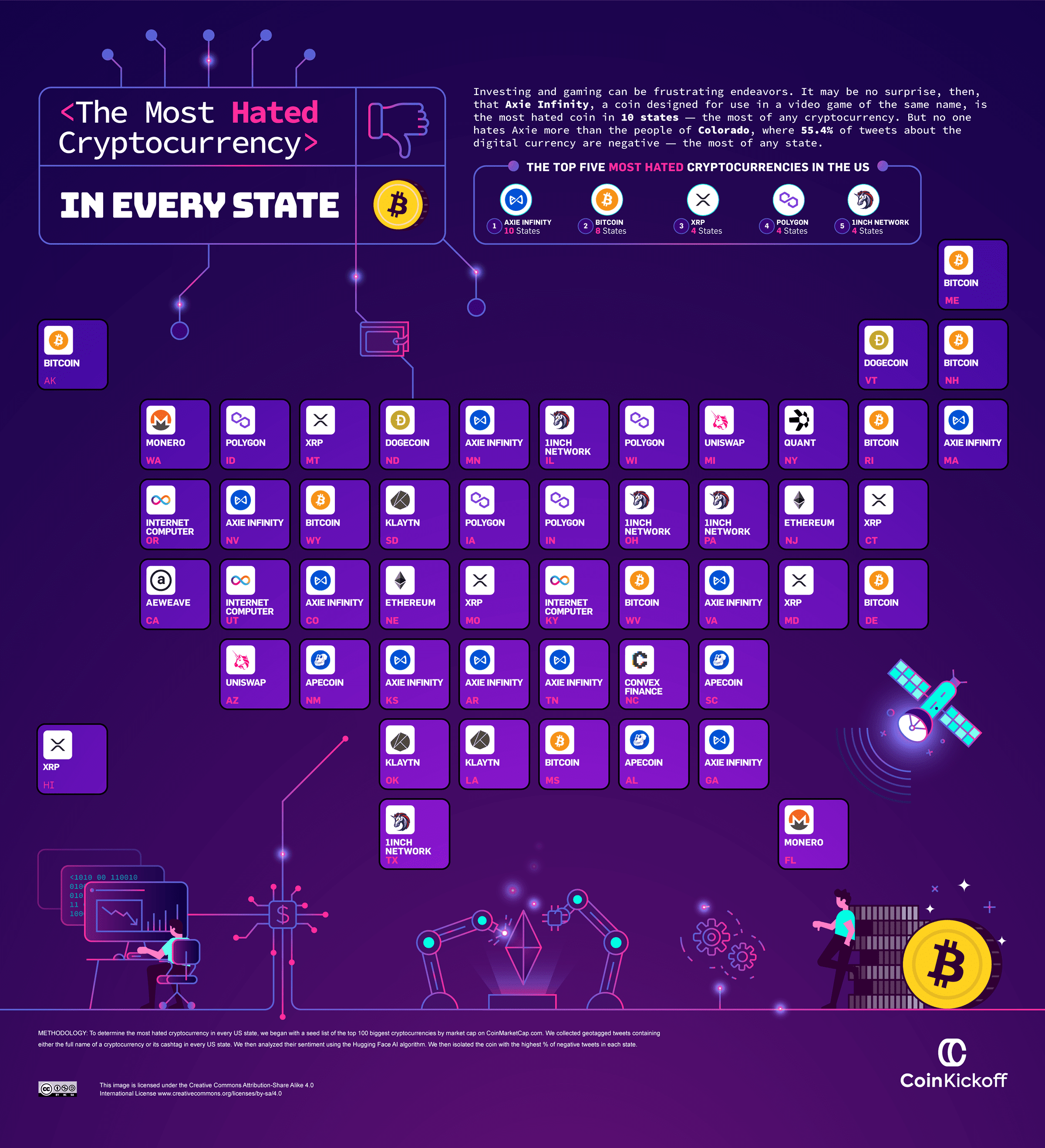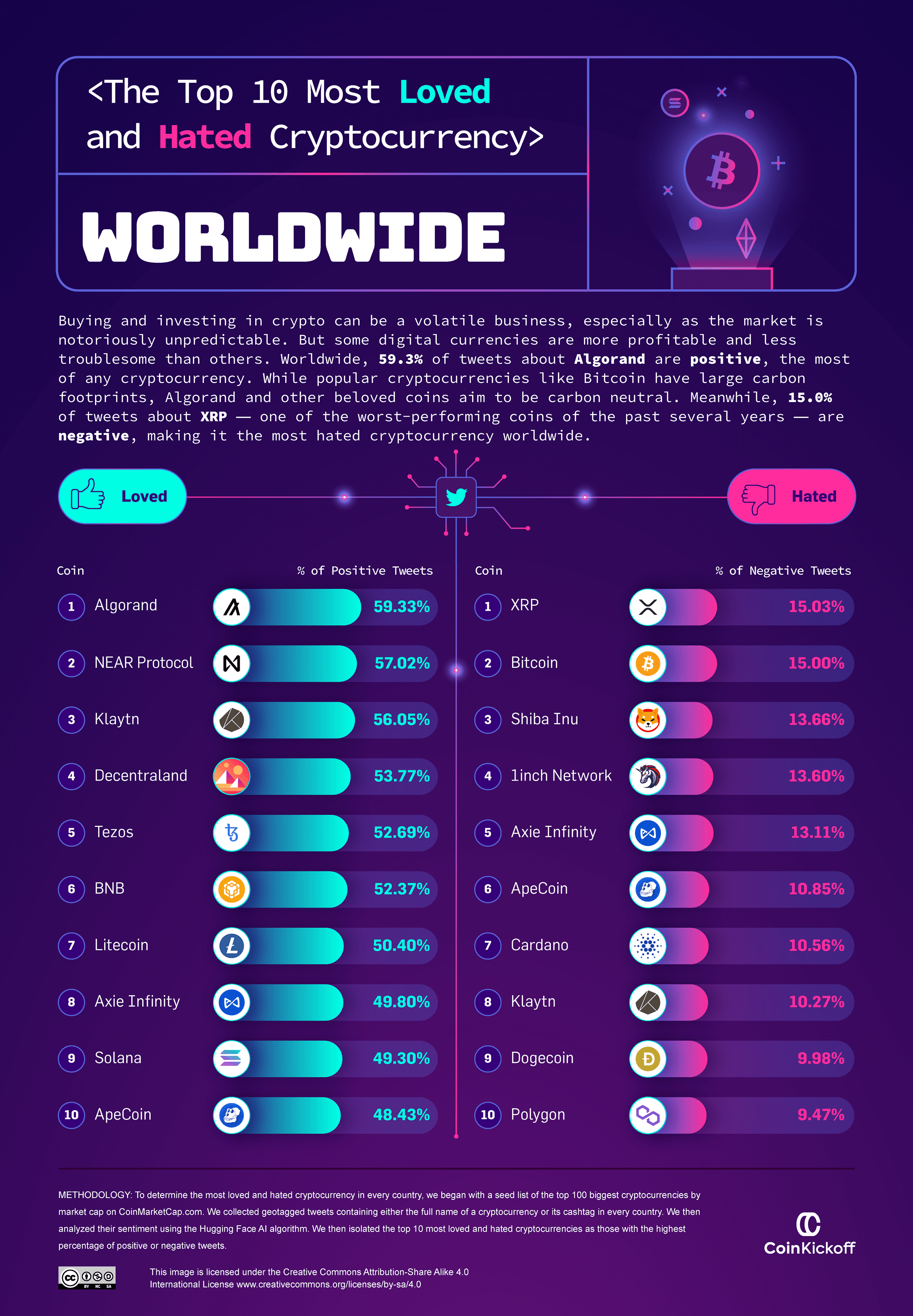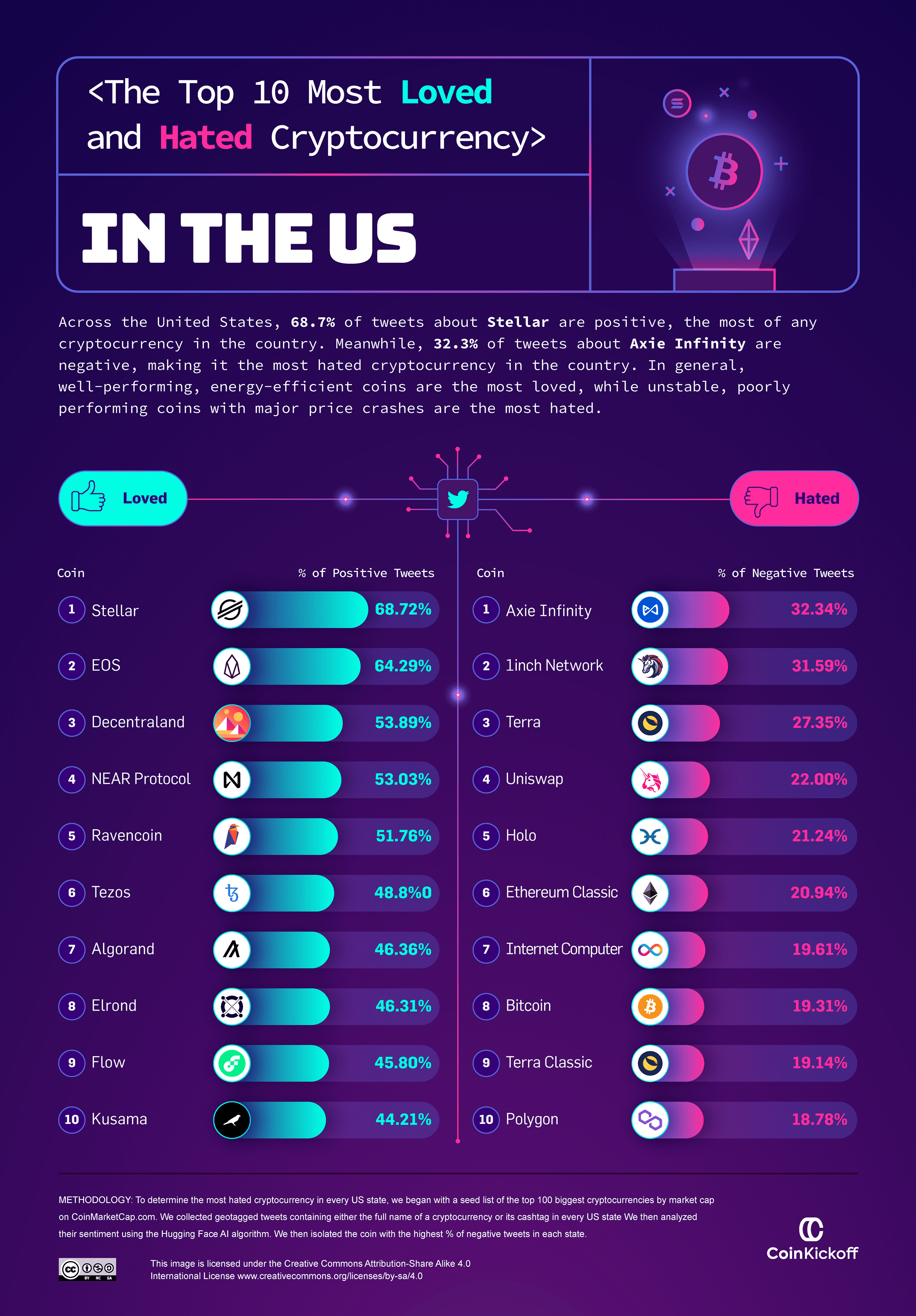The most loved (and hated) cryptocurrency in every country / Digital Information World
But not all cryptocurrencies are created equal. And they’re certainly not thought of as equal.
Some are widely loved by investors and enthusiasts, while others are met with a fair amount of scepticism and criticism.
But which of those cryptos do people love the most? And which digital tokens do they absolutely hate?
Those are the two questions that inspired the latest study from the crypto experts at CoinKickoff. And they found the answers by turning to that great arbiter of 21st-century public opinion – Twitter.
The CoinKickoff team ran nearly 1 million tweets mentioning the 100 largest cryptocurrencies by market cap through the AI-powered sentiment tracking software HuggingFace.
Then they translated all that data into several global maps showing the most loved and hated crypto in every country.
Let’s take a look at the results.
The most loved cryptocurrencies
Ethereum and Solana tie for first place. They ranked as the most loved coins in 10 countries. The love for Ethereum and Solana is particularly strong in Sweden, Chile, and Costa Rica.
Cardona and Tezos are the most loved cryptos in six countries, putting them in joint third place.
Elrond makes a surprise appearance. Elrond is a cryptocurrency and blockchain platform designed to handle high volumes of transactions. It’s one of the more complicated smart contract platforms, requiring deep technical expertise to appreciate. Still, it managed to come out on top in 5 countries. They include Bangladesh and Australia.
Bad news for Bitcoin
Bitcoin is the original cryptocurrency and remains the largest by market cap.
And – at least in crypto terms – it has a strong track record of stability and growth. Back in 2011, you could have picked up a whole Bitcoin for just $1. And despite an 80% drop in value since the 2022 high, that $1 would still be worth over $20,000. Not a bad investment.
Bitcoin is also on the verge of mainstream adoption. Companies such as PayPal and Square have started allowing their customers to buy and sell Bitcoin on their platforms, while institutional investors such as Goldman Sachs and BlackRock have started offering investment products tied to the price of Bitcoin.
Another factor driving mainstream adoption is the growing number of merchants and businesses accepting Bitcoin as payment. This includes everything from small online retailers to large brick-and-mortar stores, as well as a wide range of service providers such as law firms, accountants, and real estate agents.
The increasing regulatory clarity and support of governments and central banks towards Bitcoin and other cryptocurrencies are also contributing to its mainstream adoption.
But despite its strong fundamentals, Bitcoin still sits at the top of CoinKickoff’s most hated crypto list.
According to Twitter sentiment, Bitcoin is the most hated crypto in 16 countries, including Finland, Vietnam, Finland, and Uzbekistan,
Crypto users in Qatar appear to have the biggest issue with Bitcoin. More than 1 in 5 (20.4%) of Bitcoin-related tweets coming out of this Gulf State contain what Bitcoin enthusiasts call fear, uncertainty, and doubt – a.k.a – the FUD. That’s the highest percentage of negative tweets from anywhere in the world.
The world’s most hated cryptos
Axie Infinity is the second most hated crypto. According to the CoinKickoff data, it’s hated more than any other crypto in seven countries, including Saudi Arabia and Turkey.
Axie Infinity is a blockchain-based game that allows players to breed, raise, and battle fantasy creatures called “Axies.” Players can also earn cryptocurrency by participating in the game’s economy, such as by breeding rare Axies or farming in-game assets.
But why do so many people hate Axie? Well, it’s probably down to the price – with an emphasis on the down part. Investors who bought in during the crypto summer of 2022 have seen the value of their coins drop by 1300%. Ouch.
The network also suffered a major cyber attack in 2022, with hackers stealing more than $620million.
Uniswap, XRP, and Apecoin share third place on the most hated list. They’re hated in six countries each.
Crypto sentiment in the USA
Around 20% of adults in the USA own cryptocurrency.
And if this study is anything to go by, we can bet that many of them hold a little bit of Stellar. Almost 70% (68.72%) of US-geotagged tweets mentioning Stellar were analyzed as positive by HuggingFace.
Stellar Lumens (XLM) is a digital asset and cryptocurrency that facilitates transactions on the Stellar network. The Stellar network is an open-source, decentralized payment protocol that allows for fast and cheap cross-border transactions.
The Stellar network uses its native digital asset, XLM, as a bridge currency to facilitate transactions between different fiat currencies and cryptocurrencies. The Stellar network also allows for creating and issuing custom tokens, making it useful for various use cases such as remittances, micropayments, and mobile money.
When it comes to negative crypto sentiment in the USA, Axie Infinity makes another unwanted appearance. Just under 1 in 3 (32.34%) of US tweets mentioning the coin were less than flattering; that makes Axie Infinity the USA’s most hated crypto.
What does the study tell us about the future of crypto?
It is worth noting that the data from CoinKickoff is based on a survey of a relatively small sample of individuals and should be taken with a grain of salt.
Additionally, the crypto market is highly dynamic, and the sentiment towards a particular cryptocurrency can change quickly depending on the market conditions or recent news.
Future investing in crypto
Despite the scepticism and criticism that some cryptocurrencies face, it’s clear that digital currencies are here to stay. Bitcoin and Ethereum, in particular, have established themselves as major players in the crypto market, and are likely to continue to be popular among investors and enthusiasts.
However, it is important for investors to do their own research and to be aware of the risks and controversies associated with certain digital currencies before making any investment decisions.
Read next: Bill Gates Admits ‘Being Rich’ Can Make You Out Of Touch Despite Supporting The Billionaire Status

